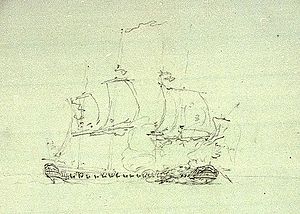Action of 18 June 1793
| Action of 18 June 1793 | |||||||
|---|---|---|---|---|---|---|---|
| Part of the French Revolutionary Wars | |||||||
 Nymphe and Cleopatre, sketch, Nicholas Pocock, c. 1793 |
|||||||
|
|||||||
| Belligerents | |||||||
|
|
|
||||||
| Commanders and leaders | |||||||
| Captain Edward Pellew | Captain Jean Mullon † | ||||||
| Strength | |||||||
| Frigate HMS Nymphe | Frigate Cléopâtre | ||||||
| Casualties and losses | |||||||
| 23 killed, 27 wounded | 63 casualties, Cléopâtre captured | ||||||
The Action of 18 June 1793 was the first decisive and one of the most celebrated encounters between British and French frigates during the French Revolutionary Wars. The action occurred off Start Point in Devon, when the British frigate HMS Nymphe encountered and chased the French frigate Cléopâtre. During the previous month, Cléopâtre and another frigate, Sémillante, had been successfully raiding British merchant shipping in the English Channel and Eastern Atlantic from their base at Cherbourg. In response, the British frigates Nymphe and HMS Venus had been ordered to intercept and defeat the French frigates and on 27 May Venus and Sémillante fought an inconclusive engagement off Cape Finisterre.
On 17 June, Nymphe was cruising alone off the Devon coast under Captain Edward Pellew when a sail appeared to the south east. Closing to investigate, Pellew rapidly identified the ship as Cléopâtre and gave chase, the French frigate initially fleeing but Captain Jean Mullon then turning to fight as Nymphe began to overtake his ship. At 06:15, with both crews cheering loudly, the frigates exchanged broadsides, the action lasting 50 minutes. Both ships fought hard, but at 07:10 the British crew were able to successfully board the French frigate and haul down the tricolour. Mullon was mortally wounded in the engagement, and his crew lost 63 casualties compared to 50 on board Nymphe. Pellew returned to Britain with his prize, the first major French warship captured during the conflict, and was proclaimed a hero.
In February 1793, the National Convention that governed the French Republic expanded the ongoing French Revolutionary Wars by declaring war on Great Britain and the Dutch Republic. The light vessels of the British Royal Navy had been preparing for the conflict for several months, having concentrated in June 1792 at Spithead in anticipation of the outbreak of war. These ships were stationed in large numbers in the North Sea and the English Channel to defend British maritime trade against the threat of French commerce raiders operating from the French Channel ports. The French Navy by contrast was riven with the same social divisions that had divided France in the aftermath of the French Revolution four years earlier. This had led to the collapse of the professional officer corps and the elimination of the rank of trained seamen-gunners on the grounds of elitism, resulting in a dearth of experience both in seamanship and naval combat.
...
Wikipedia
